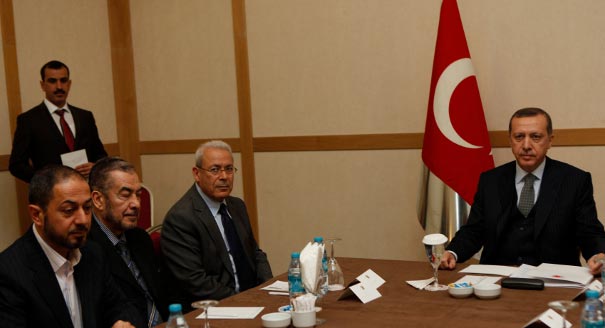Turkey’s Relations with the Syrian Opposition
The Muslim Brotherhood and the Kurdish Issue
Turkey’s backing of the Syrian opposition in its efforts to overthrow the regime does not simply stem from selfless dedication to the cause of democracy. The Turkish government is also seeking to protect its own interests. Two issues are of great importance to Turkey: relations with whatever group will come to power in Syria next and the Kurdish issue. Turkey has not been sparing in its efforts to bring about reconciliation among the SNC factions, urging them to overcome their differences so as not to break up the council.
The fact that the SNC is largely a Sunni Muslim organization and that an estimated 25 percent of its members are Muslim Brothers makes it easy for Turkey to back the group. Turkey, a predominantly Sunni country, managed to develop good relations in the past with the Alawi-dominated Assad regime, but there is no doubt that it would look more favorably upon a Sunni regime. Ideologically rooted in moderate Islam, Turkey’s ruling party, the Justice and Development Party (AKP), furthermore feels close to the Muslim Brotherhood not only in Syria but elsewhere in the Arab world. Even when relations between Syria and Turkey were strong, Prime Minister Erdogan never concealed his sympathy for the Muslim Brotherhood from Bashar al-Assad and had even asked him to grant the Brothers amnesty and legalize their movement, according to Turkish media.
More recently, members of the Muslim Brotherhood have been the major intermediaries between Ankara and the Syrian opposition. For example, there are prominent Syrian Turkish businessmen with ties to both the AKP and the Muslim Brotherhood who are likely to become influential in the next phase of Syrian-Turkish relations. One of them is Gazi Misirli—Ghazwan al Masri in the Syrian transliteration—a prominent member of MUSIAD, a business association close to the AKP.
The secular opposition in Turkey and the Kurdish factions of the Syrian opposition tend to exaggerate Islamists’ grip on the Syrian opposition and the role played by Turkey in supporting them. In reality, Ankara is seeking, first and foremost, to encourage the establishment of a government in Damascus that would ensure political and social stability in Syria, and therefore indirectly in the entire region, while maintaining a good relationship with Turkey. Further, Turkey’s leaders are well aware that the entire Syrian opposition is not made up solely of the Muslim Brotherhood—this is far from being the case—and that in staking too much on one marginal section of the anti-Assad front, they could ruffle the feathers of other factions, with the additional effect of upsetting Ankara’s Arab and Western allies in settling this conflict. Thus, the delicate task for Turkish diplomacy today is to establish preferential ties with the Muslim Brotherhood without neglecting the other political forces at work in the process.1
One of these forces is the Kurdish opposition in Syria. Turkey’s policy is influenced by its concerns about the possible impact of the Kurdish issue in Syria on Kurds in Turkey. Since the uprising began, Syria’s Kurdish parties, irrespective of their leanings, have adopted a wait-and-see policy. The most important of the Kurdish parties, the Democratic Union Party, remains on good terms with the Assad regime. The party is also known to be close to the PKK, which increases Ankara’s apprehensions about renewed guerrilla attacks against Turkey from Syrian territory.
Ankara dreads that cultural or regional autonomy in some form or other will be granted to the Syrian Kurds and that in the medium term, this situation will spur similar demands from the Kurds in Turkey. The Kurdish issue has reached such a level of regionalization that what transpires in one country can trigger chain reactions in others. Bestowing wide autonomy to Kurds in post-Saddam Iraq undisputedly influenced the fate of Kurds in Turkey, with the regional context of the Middle East tilting toward the Kurds since the fall of Saddam Hussein. This regionalization has forced Ankara to monitor the Kurdish issue globally.
One of the reasons why Kurdish parties and associations have not joined the Syrian opposition is that they believe Erdogan’s Turkey will help the Muslim Brotherhood come to power in Damascus provided that it grants neither a specific status nor autonomy to the Kurds. Kurdish members of the SNC expressed this concern openly during a meeting of the Friends of Syria before walking out in protest. To restore a degree of unity, the SNC published a “Kurdish document” pledging to recognize Kurdish identity and local autonomy.
Nevertheless, fears persist that Turkey might demand that the Syrian opposition withhold specific rights from the Kurds in exchange for its support. But Ankara might also adopt a benevolent attitude toward the Kurds in Syria, as they did in Iraq, in order to avoid antagonizing and provoking them into supporting Kurdish PKK separatists in Turkey. Thus it could aim not to align against the Kurds but instead to be their ally—even protector—in order to better deal with its own Kurdish problem.
Turkey’s Choices
Despite its decision to turn against Bashar al-Assad and embrace the Syrian opposition, Turkey still faces a dilemma in its Syria policy. On the one hand, Ankara continues to take a tough stand against Syria and raises the possibility of intervention. On the other, it knows that any kind of intervention could provoke a direct conflict with its own violent Kurdish opposition party, the PKK, which is supposedly finding shelter in Syria.
Ultimately, Turkey is trying to avoid becoming even more entangled in the Syrian problem and is counting on the international community to find a solution. But no such solution is imminent. Turkey will face the same dilemma for months to come, while a growing number of refugees pour across its borders.
1 The Muslim Brotherhood in Syria issued a document that it called a pledge and charter, and in which it stated its commitments for the future of post-Assad Syria. The Brotherhood vowed to establish pluralism and democracy in a civil constitutional State, with equality of all citizens—even in access to the country’s “highest level posts,” and with full respect for human rights and freedoms. For more detail see Shane Farrell, “Syrian Brotherhood assuages fears with new charter,” NOW Lebanon, available at:



